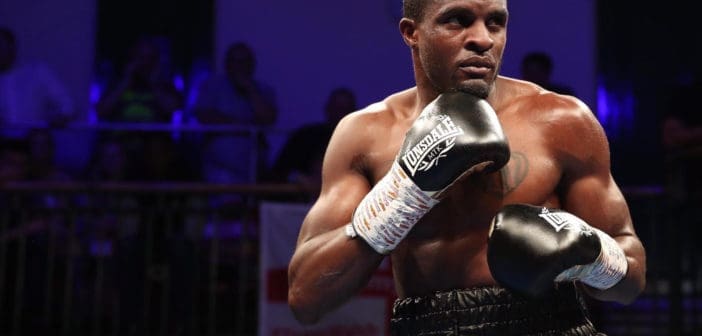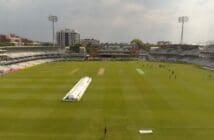At York Hall on Friday night, Ohara Davies made his long-awaited return to the squared-circle. His journey to the ring was met with the rock song “Thunderstruck” by ‘ACDC’. Perhaps, a perfect sound indicative of his character.
The 27-year-old Hackney born boxer edged out former IBF lightweight champion Miguel Vazquez on Friday night, claiming a points victory at York Hall. After being in the boxing wilderness for eight months, Davies was back and was at the start of plotting another comeback trail.
On more than one occasion ‘OD’ had been the talk of British Boxing. Whether that had been for the good, bad or something in-between, all boxing fans knew his name. His explosive style coupled with his outspoken personality meant the boy with virtually no amateur experience had suddenly catapulted himself to the higher echelons of boxing.
Whilst many fighters rely on paycheck to paycheck, plying their trade on small-hall shows, Davies was about to earn a six figure sum in his 16th fight, three years after turning professional in 2014.
Heading to Glasgow for a domestic dust-up against the hometown star Josh Taylor, many tipped Davies to win and be on the cusp of a world title shot. Gathering a reputation for being one of Britain’s hardest pound-for -pound punchers, Davies talked the talk but backed his words up inside the ring.
In the build-up to the bout, Davies had started to become a divisive character in the sport, polarising opinion with the way he conducted himself. There was a feeling that his outlandish behaviour and his over-confident pre-fight hype was starting to creep over the line. Weeks before, he walked around Liverpool insulting how the people in the city lived. He famously claimed: “Liverpool have some of the best females, but the worst fans.”
Developing a marmite sort of character, Davies began to relish the ‘bad boy’ image he portrayed. After all, as long as he did his job in the ring, it would not be affected.
However, that night in Glasgow in July 2017, was the beginning of the recent decline of Ohara Davies. Seemingly obsessed with his power and believing his own hype, he was blown away inside seven rounds by Josh Taylor. The latter battered him from pillar to post, knocking Davies down twice before the referee stopped the fight.

Photo: Action Images
With accusations of him quitting, turning his back when Taylor was punching him against the ropes, Ohara Davies had offered himself up for intense scrutiny. In what is the worst insult a boxer could take, the quit element of Davies performance had well and truly shattered the hype surrounding him up to that point.
Fast forward to present day and nearly two years later, Davies is still trying to get back to what he had. The hype, the cheerleaders in his camp and the limelight, the thing that made him tick the most, had vanished. The mysterious aura that had been created suddenly turned ominous overnight.
Months later, the track that the boxer was trying to get back on took yet another turn. In December, Davies was suspended by his promotional company, Matchroom and later sacked for comments regarding the newspaper ‘The Sun’ and the people of Liverpool. The newspaper had long been shunned on Merseyside over its controversial coverage of the Hillsborough disaster in 1989 in which 96 Liverpool football fans died.
In an effort to goad domestic rival Tommy Coyle into a fight, Davies made some ill-informed comments regarding the conflict:
“The Sun are my favourite newspaper. I will wear their logo on my shorts and they will work with Eddie Hearn to promote my fight one day.
After I knock you out my first interview will be with the Sun. #BuyTheSun”.
Within a few hours of the tweet being sent, the uproar had sent his career into tatters. Dropped by Matchroom and his manager, Davies also left his long standing training team.
From being one of boxing’s most desired prospects, Ohara Davies had now become unwanted. The team he once knew, the environment he once trained in, altogether disappeared.
In a single day, the harsh reality of boxing had struck. In a single-minded, cut-throat industry, Davies was left out in the cold in the most ruthless sport of all.

Davies in action against Vazquez – Photo: Action Images/Peter Cziborra
Wrapped up in the character he created for the media and the sport, he had been the persecutor of his own downfall. Despite an initial recovery, he lost again to Jack Catterall in October of last year. After a brief retirement and a couple of encounters on social media, Davies returned on Friday in a comeback fight against Miguel Vazquez.
However, as is anything with him, nothing is what it seems or meant to be. He struggled his way to a dubious points victory and left the ring with pain for his troubles. Breaking his rib in round three, Ohara Davies went to hospital straight after the fight.
So what now? Another half-hearted comeback or leaving the sport as the forgotten man? A boxer that promises so much, yet delivers so frustratingly little inside and outside of the ring, does have a small window of opportunity though.
On the domestic scene, there are fights to be made. Clashes with Lewis Ritson, Joe Cordina and Robbie Davies Jnr are all potentially viable and will capture the interest of the boxing public.
Whilst there is no denying the innate talent he possesses, there is still question marks over his mentality and desire to win. One thing is for sure though, if Ohara Davies is willing to go back to the drawing board and learn from past failures, his boxing career isn’t quite over yet.
Other Sports
News
![Prost International [PINT]](https://prostinternational.com/wp-content/uploads/2021/08/PINTtFontLogoRoboto1536x78.jpg)



